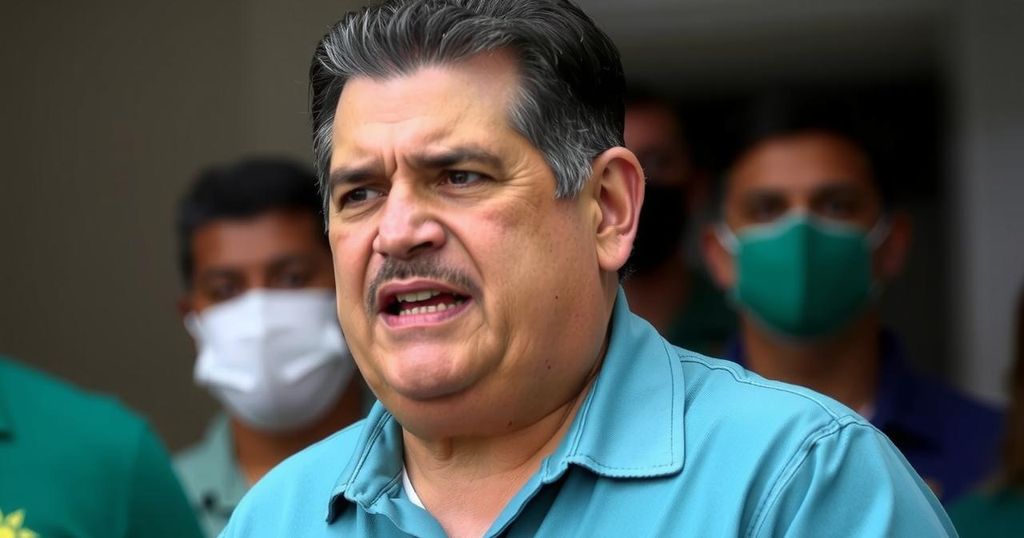Colombia has proposed to take custody of the Argentine Embassy in Caracas, facilitating safe passage for six aides of opposition leader María Corina Machado amid escalating Venezuelan government repression. Foreign Affairs Minister Luis Gilberto Murillo indicated ongoing negotiations with Venezuela and highlighted international concerns regarding human rights violations. The situation reflects Colombia’s growing involvement in Venezuela’s political crisis and underscores the diplomatic complexities involving neighboring countries.
Colombia has extended an offer to assume custody of the Argentine Embassy in Caracas, where six aides of opposition leader María Corina Machado have sought refuge since March. Luis Gilberto Murillo, Colombia’s Foreign Affairs Minister, announced this development during a conference in San Andrés, indicating ongoing dialogues with Venezuela’s government to facilitate the safe passage of these opposition figures. Murillo noted that Venezuela appears open to negotiation but seeks a commitment from Colombia to assist in the release of an unidentified individual connected to the Venezuelan government and former Ecuadorian Vice President Jorge Glas, who has been imprisoned since a controversial raid in April.
The ongoing negotiations reflect Colombia’s increasing role in navigating the political complexities following President Nicolás Maduro’s crackdown on dissenters after his disputed re-election. The aides, who are currently in the Argentine Embassy, are facing allegations of terrorism related to their support of Machado and her proposed successor, Edmundo González Urrutia. In the aftermath of the election, Argentina severed diplomatic ties with Venezuela and transferred embassy management to Brazil, which has since faced pressures from Venezuelan police.
Recent actions by Venezuelan authorities have included heightened intimidation towards the Embassy, with reports indicating police have restricted access to basic necessities for the six sheltered opposition leaders. The United Nations Human Rights Council has deemed these actions as violations of international law, further escalating tensions. Notably, opposition campaign manager Magalli Meda and advisers Pedro Urruchurtu and Claudia Macero are among those affected.
As tensions rise, both Maduro and González, who has been living in exile in Spain since August, assert their intentions to be inaugurated as the new presidential term commences on January 10. Acting on orders from Colombian President Gustavo Petro, Murillo has engaged in dialogues with both Brazil and Ecuador regarding this matter. Brazil’s Foreign Affairs Ministry has confirmed its continued custodianship of the Embassy until Argentina designates an alternative managing state. Argentina has remarked that recent events highlight the disregard for fundamental human rights in Venezuela under Maduro’s leadership. Though relations between Venezuela and Brazil have been strained, recent thawing indicates ongoing diplomatic discussions, despite President Luiz Inácio Lula da Silva withholding recognition of Maduro’s electoral victory and urging for a release of electoral records to substantiate claims of legitimacy.
The political climate in Venezuela has become increasingly repressive, particularly following President Nicolás Maduro’s recent re-election amidst allegations of electoral fraud. This situation has resulted in a serious crackdown on dissent, particularly targeting opposition leaders and their aides. Argentina’s decision to provide refuge to Machado’s aides marks a significant diplomatic stance against Maduro’s administration. Colombia’s involvement seeks to navigate these tensions and mediate the safe passage for these officials while addressing regional diplomatic concerns related to Ecuador and Brazil.
In summary, Colombia’s proposal to take over the Argentine Embassy in Caracas illustrates its proactive approach to aid Venezuelan opposition leaders facing persecution. The unfolding negotiations highlight the complicated dynamics of international diplomacy amid escalating tensions in Venezuela, where human rights abuses are increasingly documented. As Colombia positions itself as a mediator, the outcome of these discussions may have significant implications for the political landscape in the region.
Original Source: www.batimes.com.ar






